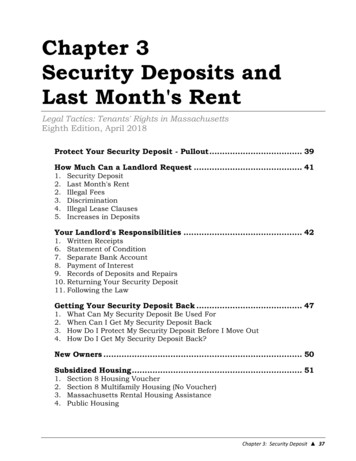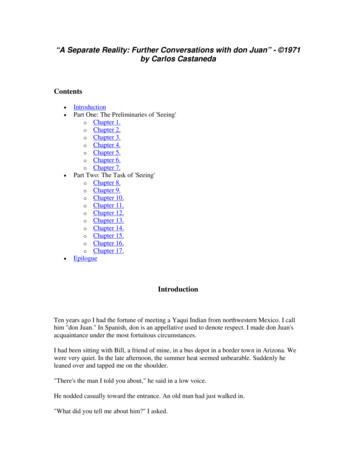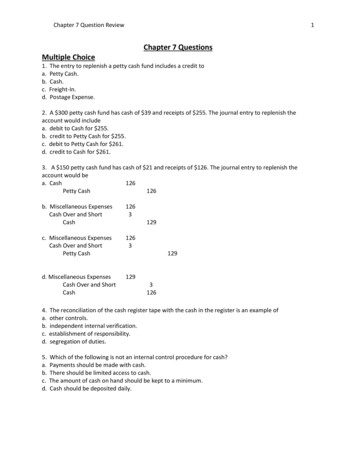
Transcription
Chapter 3Security Deposits andLast Month's RentLegal Tactics: Tenants' Rights in MassachusettsEighth Edition, April 2018Protect Your Security Deposit - Pullout . 39How Much Can a Landlord Request . 411.2.2.3.4.5.Security DepositLast Month's RentIllegal FeesDiscriminationIllegal Lease ClausesIncreases in DepositsYour Landlord's Responsibilities . 421. Written Receipts6. Statement of Condition7. Separate Bank Account8. Payment of Interest9. Records of Deposits and Repairs10. Returning Your Security Deposit11. Following the LawGetting Your Security Deposit Back . 471.2.3.4.What Can My Security Deposit Be Used ForWhen Can I Get My Security Deposit BackHow Do I Protect My Security Deposit Before I Move OutHow Do I Get My Security Deposit Back?New Owners . 50Subsidized Housing . 511.2.3.4.Section 8 Housing VoucherSection 8 Multifamily Housing (No Voucher)Massachusetts Rental Housing AssistancePublic HousingChapter 3: Security Deposit 37
Help with Deposits . 521. Residential Assistance for Families in Transition (RAFT)2. HomeBase3. Private Programs38 Chapter 3: Security Deposits
Pullout 3Protect Your Security DepositTenants’ Rights in MassachusettsHow Much Can aLandlord ChargeThe law says landlords: May only charge for the first and lastmonth’s rent, a new lock and key, and asecurity deposit when you first move in. May not ask for a security deposit that ismore than your 1st month’s rent. May not charge other fees, like pet fees,cleaning fees, and application fees.Protect YourselfBefore You Move In Get a receipt for any money you paythe landlord when you move in. If theydo not give you a receipt, use RentReceipt (Form 2).Subsidized HousingThe amount a landlord can charge for asecurity deposit depends on the subsidy youhave.If you have a Section 8 voucher under theHousing Choice Voucher Program or the ProjectBased Voucher program, you can be required topay up to one total month’s rent. That is,your share of the rent plus the housingagency’s share. If one total month’s rent is 1,000/month, a landlord could charge you 1,000 for a security deposit.If you have "project-based" Section 8assistance in privately owned multifamilyhousing, the best thing to do is to look at thelease. Project-based Section 8 assistance is nota voucher. Only pay in cash if the landlord cangive you a receipt right away.If you have a voucher funded by theMassachusetts Rental Voucher Program orthe Alternative Housing Voucher Program, alandlord may charge you a security deposit upto one total month’s rent. Start a folder and keep receipts andother documents related to your newapartment in a safe place.Your Landlord’sResponsibilities List and photograph anything that isbroken or damaged. Date your photosand keep them in your folder.Landlords must: If the landlord does not give you aStatement of Conditions, when youmove in, send Statement ofCondition (Form 3) to your landlordwith the list of anything broken ordamaged. Give you a receipt within 30 days ofreceiving your security deposit. Thereceipt must tell you what bank yoursecurity deposit is in. Keep your security deposit in a bankaccount, separate from their own money. Pay you interest on your security depositand last month’s rent once a year. If theyChapter 3: Security Deposit 39
do not, you can subtract that amount fromyour next month’s rent.Landlords who disobey any part of this lawmust return all of your security deposit if youask for it, even if you still live there.Protect YourselfWhile You Are RentingIf your landlord does not pay you interestonce a year on your security deposit and lastmonth’s rent, you can subtract the amountfrom your next month’s rent.What Can a SecurityDeposit Be Used ForAfter you move out, a landlord may only useyour security deposit for unpaid rent or torepair damages you or your guests caused.The damage must be more than “reasonablewear and tear.” Landlords are not allowed touse the security deposit for routine painting,cleaning or small repairs.Protect YourselfWhen You Move OutMove your things out, clean the apartment,and fix anything you can.Getting a SecurityDeposit BackIf you left your apartment in the samecondition as you found it, the landlord mustreturn your security deposit balance, withinterest, within 30 days after you move out.If the landlord does not return your securitydeposit, send her a letter formally asking herto return 100% of your deposit. You can useSecurity Deposit Demand Letter forTenants Moving Out (Form 6).If the landlord still refuses to return yoursecurity deposit, you can sue in Small Claimscourt. She may have to pay you 3 times thedeposit. Learn more at:www.mass.gov/courts/selfhelp/small-claims/New OwnersYou should not lose your security deposit orlast month’s rent, because of a foreclosure, asale to a new owner or a new managementcompany.Keep track of who the new owner is.If the new owner asks you to pay anothersecurity deposit or last month’s rent – Say,“No!”Make a copy of the list. Keep one and giveone to the landlord.A new owner has 45 days to send you a noticeabout your security deposit and last month’srent. If 45 days pass and you have not heardfrom the new owner, write your old landlordand ask her to return your money, plusinterest.Return the keys and give the landlord yourforwarding address so she can send you thesecurity deposit.If the old landlord does not return yourmoney, you can sue her for 3 times thesecurity deposit that you gave her.Inspect the apartment with your landlord andmake a list of anything your landlord saysneeds repair. You can also take photos.i40 Chapter 3: Security DepositsMassLegalHelp.org/SecurityDepositsLegal Tactics: Tenants Rightsin MassachusettsMay 2017
Chapter 3Security Deposits andLast Month's Rentby Maureen McDonaghThe Massachusetts security deposit law protectsboth you and your landlord.Once you agree to rent a place, your landlord cancharge you a security deposit to protect herproperty from any damage you might cause. Shecan also charge you last month’s rent to protecther if you move out before paying it.The security deposit law also protects you andlandlords must follow the law.1 This chapterexplains your rights if your landlord charges youa security deposit, last month’s rent or both.The most important thing you can do to protectyourself is to get written receipts from yourlandlord for the security deposit and last month’srent. Only give your landlord cash if shegives you a receipt right away.How Much Cana Landlord RequestWhen you first move in, your landlord may onlycharge you: a security deposit, 1st month's rent, last month's rent, and the cost of a new lock and key.2A security deposit or a last month’s rent cannotbe more than the amount of your 1st month’srent.Italicized words are in the GlossaryExample:If the 1st month’s rent is 1,000, a landlord cancharge: 1,000security deposit 1,0001st month’s rent 1,000last month’s rent .the cost of lock and key Total a landlord can charge1. Security DepositA security deposit and last month's rent are notthe same.A security deposit is money you pay a landlordto protect her in case you damage the apartment.But a security deposit is your money. If you donot damage the property, you should get yourdeposit back when you leave.Your landlord must keep your security deposit ina bank account in Massachusetts. The accountmust be separate from the account she keeps herown money in. And every year she must pay youthe interest it earns.2. Last Month's RentLast month's rent protects your landlord inadvance if you leave and do not pay rent the lastmonth you are there.Your landlord does not have to keep your lastmonth's rent money in a separate bank account.But she does have to pay you interest on it everyyear.Chapter 3: Security Deposit 41
If you pay last month's rent in advance, do notexpect to get this money back when you moveout. It will pay for your last month.If you do not pay last month’s rent in advance,you must pay for your last month of rent even ifa landlord holds a security deposit.2. Illegal FeesIt is against the law for a landlord to chargetenants any other “moving in” fees, like: application or holding deposits, amenity or community fees, up-front pet fees, cleaning fees, or credit checks or application fees.3It is also illegal for a landlord to charge you afinder’s fee. But if a real estate broker – not thelandlord – helps you find your rental unit, thatperson may charge you a “finder's or broker’sfee.” A rental agent can charge a finder's fee onlyif she is a licensed real estate broker. The brokermust provide a written notice to prospectivetenants with information about the fee andwhether or not it is paid if a tenancy is notcreated. 4 To find out if a rental agent is alicensed real estate broker, go to the internet at:www.state.ma.us/reg/boards/re/ and click on"Check a License."If a landlord tries to charge you an illegal fee: You can refuse to pay it. You do not have to rent from that landlord.Find a landlord who follows the law. If you do rent from that landlord, get awritten, itemized receipt for everything youpay. Make sure the receipt, includes the extrafees and what they are for. After you movein, subtract the amount you paid in illegalfees from your rent. Write the landlord aletter that says you have subtracted theillegal fees from the rent. Include theitemized receipt.42 Chapter 3: Security Deposits3. DiscriminationA landlord that charges a fee or security depositto some groups of people and does not chargethe same fee or deposit to others may bebreaking the discrimination laws. It is illegal for alandlord to discriminate against groups the lawprotects, including: single parents, people ofcolor, people on welfare, people with smallchildren, people with disabilities, and people withSection 8 or other rental assistance. If thelandlord tries to discriminate against you, seeChapter 7: Discrimination.4. Illegal Lease ClausesYour landlord cannot take away your rightsunder the security deposit law by using a writtenlease that conflicts with the law. “Your landlordcan keep your security deposit if you rent theapartment for less than 6 months,” is an exampleof an illegal clause. Your landlord cannot dothis.If your landlord has you sign a lease with a clausethat conflicts with the security deposit law, youhave the right to get your security deposit backas soon you ask for it. See Getting Back YourSecurity Deposit.55. Increases in DepositsIf your rent increases after you move in, yourlandlord may not increase your security deposit.Your security deposit is limited to the amount ofyour very first month's rent.6But if the rent goes up and you agree to pay thehigher rent, your landlord can ask you to paymore for the last month’s rent. So, your lastmonth’s rent equals the new higher rent.Your Landlord'sResponsibilitiesIf your landlord charges you a security deposit,last month’s rent or both, she must:
1. Give you written receipts.2. Give you a statement that describes thecondition of your apartment, if she takes asecurity deposit.73. Keep your security deposit in a separate bankaccount.4. Pay you interest every year on both yoursecurity deposit and last month’s rent.85. Keep records of security deposits andrepairs.96. Return your security deposit to you at theend of your tenancy if there is no damageand your rent is paid.7. Return your security deposit to you if shefails to follow the security deposit law.1. Written ReceiptsThe most important step you can take when youmove in is to get a complete receipt from yourlandlord that spells out all the money you gaveher and what it is for.Only give your landlord cash if she gives youa receipt right away. If the landlord refuses togive you a written receipt, use Security DepositReceipt and Last Month’s Receipt (Form 4).You should get 3 kinds of receipts from yourlandlord. They must all be written. 1st Receipt: She must give you a writtenreceipt when you give her your securitydeposit or last month’s rent.10 2nd Receipt: She has 30 days to put yoursecurity deposit in a bank and give you a2nd receipt. This receipt must say whereyour security deposit is.11 3rd Receipt or Statement: Every year shemust give you a statement with the amountof interest you are owed on your securitydeposit and last month's rent.12Each receipt or statement about your securitydeposit or last month’s rent must include:1st Receiptfor securitydeposit or lastmonth’s rentSecurityDepositLastMonth'sRentAmount of moneyreceived Date money was received Name of person you givethe money to if differentfrom landlord Statement that you areowed interest on themoney What the money is forName of landlordStatement that you shouldgive a forwarding addressso landlord can send youinterest when you move2nd Receiptwithin 30 daysfor securitydeposit in aMass bank SecurityDepositLocation and name ofbank where your money is Account number of thefund where your money is 3rd Receipt orStatement at theend of each yearfor securitydeposit or lastmonth’s rentStatement of the amountof interest you are owedon your depositSecurityDeposit LastMonth'sRentNo receiptrequiredLastMonth'sRent If the landlord does not give you a receipt withthis information at the right time, you have theright to get your security deposit back. SeeGetting Your Security Deposit Back.Chapter 3: Security Deposit 43
6. Statement of ConditionAs soon as you move in, examine the rental unitright away. If anything is not in good condition,make notes about it and take photos. Make sureto put a date on your notes and photos.If your landlord charged you a security deposit,she has 10 days to give you a description of yourrental unit’s condition. This description must bein writing. It is called a “Statement ofCondition.”This Statement must list all the existing damagein your apartment when you move in. It mustalso cover the common areas of the place youare renting. Its purpose is to prevent disputesbetween you and your landlord when you moveout. The statement makes clear the damagealready there when you moved in. Your landlordmust also sign this Statement.Read the Statement of Condition carefully. Taketime to walk through the apartment with theStatement. Use Housing Code Checklist(Booklet 2) to help you understand what the lawrequires.If you do not send it back within 15 days, itmeans you agree completely with the landlord’sStatement.If you send your landlord a Statement ofCondition with your own list of problems, yourlandlord must return a copy within 15 days. Thelandlord must say if she agrees or disagrees withwhat you wrote. And she must sign thisstatement too.Keep a copy of everything you send thelandlord.b.If you do not geta Statement of ConditionIf you do not get a Statement of Conditionwithin 10 days of moving and there are seriousproblems in your rental unit, do your ownstatement.14 You can use Statement ofCondition (Form 3).Your Statement of Condition is important. It canprevent the landlord from using your securitydeposit to pay for damage you did not cause.c.Problems after you move inIf a landlord writes on the Statement ofCondition that there are no bad conditions,make sure this is true. If there are things that arenot in good condition, write them on thelandlord’s Statement so it describes the realcondition of the place.13 Add even small defectsto your list like holes in the walls and windowsthat do not work well. This is to protect youwhen you move out.If there is a problem with your apartment afteryou move in, let the landlord know right awayand ask her to repair it.You can also use our Statement of Condition(Form 3) and attach it to the landlord’s“Statement.”Keep a copy of the letter or email so you canalways prove that you notified the landlord abouta problem.a.Send the Statement to the LandlordYou have 15 days after you get the landlord’sStatement of Condition to send it back. You can: Make no changes to the “Statement,” sign itand send it back.Make changes, attach your own statement,notes and photos, sign it and send it back.44 Chapter 3: Security DepositsFor example, if you move in during August, youmight not find out that the heating system isbroken until several months later.It is OK to call, but also send a letter or email.
7. Separate Bank Accountc.a.After each 12-month rental period, your landlordmust send you a statement that tells you:Security DepositA security deposit is your money that thelandlord is holding.15 If your landlord chargedyou a security deposit, she must keep yoursecurity deposit in a bank account inMassachusetts.16The account must be separate from thelandlord’s money. The name on the accountmust make it clear that the money does notbelong to the landlord. The bank account mustalso be protected from creditors.17If a landlord fails to keep your money in aseparate account protected from creditors, youhave the right to sue your landlord for 3 timesthe amount of your deposit.18 See Getting BackYour Security Deposit.b.Last Month’s RentIf your landlord charged you last month’s rent,she does not have to put it into a separateaccount. But once a year she must still pay youinterest owed on it.8. Payment of InterestIf your landlord charged you a security depositor last month’s rent, she must pay you theinterest that the money earns.a.AmountThe landlord must give you all the interest yoursecurity deposit and last month’s rent earn if thebank pays less than 5% interest.19b.WhenYour landlord must pay the interest you areowed on your security deposit and last month’srent: Once a year, and Within 30 days after you move out.20Yearly payment The bank, bank address, and accountnumber that holds your security depositand, The interest you are owed on the securitydeposit and last month’s rent.At the same time, the landlord must either: Give you the interest you are owed, or Explain in this statement that you cansubtract the interest from your next rent.21If 30 days pass after the 12 month rental periodand you have not received either the interest orthe statement, you may subtract the interestowed from your next rent payment.22 It is a goodidea to include a letter with your rent paymentthat explains you are subtracting this interestfrom your rent payment.How to subtract yearly interest fromrent paymentYou pay a 1,000 security deposit and a 1,000last month's rent payment. The interest on theaccount is 1%,Your landlord must pay you a total of 20 ininterest for every year that you rent.If the landlord does not pay you directly, youmay subtract this 20 from your rent payment. If Interest is 1% on Your SecurityDeposit and Last Month's Rent 1,000x .01 10 Security DepositInterestAmount owed 1,000x .01 10 Last Month RentInterestAmount Owed Subtract Total Interest Owedfrom Your Rent 1,000- 20RentTotal interest owed tenant on security depositand last month's rent payment 980 Amount of next rent checkChapter 3: Security Deposit 45
d. Moving outIf your landlord does not pay you the interestyou are owed on your security deposit within 30days of the day you move out, or the last day ofyour lease, you can sue her for 3 times theamount of the interest owed.If you win in court, you also have the right tohave the landlord pay your lawyer’s fees andcourt costs.23 See How to get your securitydeposit back.tenancy ends. See When Can I Get MySecurity Deposit Back - When your tenancyends.11. Following the LawYour landlord must follow the security depositlaw. If she does not, she must return your entiresecurity deposit when you ask for it. Thelandlord has failed to follow the law if she: Does not give you a complete receipt within30 days of getting your deposit, see WrittenReceipts. Your landlord must keep security deposit andrepair records for all tenants who have moved inor out in the last 2 years.24 The records mustshow:Fails to put the security deposit in a separatebank account, see Separate BankAccount.28 A detailed description of any damage in anapartment when the landlord took a securitydeposit;Does not let you inspect her records ofdeposits and repairs, see Records ofDeposits and Repairs.29 Asks you orally or in writing to give up yoursecurity deposit rights. Fails to transfer your security deposit to anew owner, see New Owners. Does not give you an itemized list ofdamages within 30 days after you move out;or Does not return your deposit or any balanceowed you, with interest, within 30 days ofwhen you tenancy ends.30 See When Can IGet My Security Deposit Back - Whenyour tenancy ends.9. Records of Depositsand Repairs When repairs were made; and Receipts and the cost of any repairs.Anyone interested in renting has the right to seethese records during normal office hours.25If you already paid a security deposit and yourlandlord refuses to let you see the records, youhave the right to an immediate refund of yoursecurity deposit.2610. Returning YourSecurity DepositIf you leave your rental unit in the samecondition as you found it, the landlord mustreturn your entire security deposit. The securitydeposit and interest belong to you.If you have a written lease, a landlord has until30 days after the last day of your lease to returnthe deposit, even if you move out before thelease ends.27 If you do not have a written lease,your landlord has until 30 days of when your46 Chapter 3: Security DepositsIf your landlord does not follow the law, you canask her to return your security deposit - even ifyou are still living in the apartment. See SecurityDeposit Demand Letter (Form 5).
Getting Your SecurityDeposit Back1. What Can My SecurityDeposit Be Used Fora.While you are in the apartmentWhile you are living in the apartment, you andyour landlord may agree to use your securitydeposit to pay for rent or to repair any damageyou or a guest may cause. Your landlord can onlyuse a security deposit in this way if you and sheboth agree to it.31 If you both agree, put theagreement in writing. Both of you should sign it.Keep a copy.b.When you move outWhen you move out, your landlord can use yoursecurity deposit to pay for: Repairs for damage that are not "reasonablewear and tear." Unpaid rent, unless you legally withheld rentfor bad conditions. See Chapter 8: GettingRepairs Made. Damage that was already there when youmoved in.Reasonable wear and tear, like routinepainting and cleaning, new locks and keys,and small carpentry repairs.33 Repair costs that are not documented. Phony claims of damage. Repair costs that are unreasonably high.Using security deposit to for repairsafter you move outIf your landlord wants to use your securitydeposit for repairs, she has 30 days after youmove out to give you a complete list of thedamaged items and the cost to repair them.The list must say that she "swears underpenalties of perjury" the list is true and she mustsign it.She must also attach written receipts andestimates for the repairs.342. When Can I Get MySecurity Deposit Backa.While you are in the apartmentIf your landlord fails to follow the securitydeposit law while you are renting, you have aright to ask her to return the security depositright away. See Following the Security DepositLaw.You can ask for the entire security deposit backif the landlord: Does not give you a complete receipt within30 days of getting your deposit, see WrittenReceipts. Does not let you inspect her records ofdeposits and repairs, see Records ofDeposits and Repairs.35 Asks you orally, or in writing to give up yoursecurity deposit rights.Unpaid real estate tax increase, if yourcontract requires it.32 See Chapter 5: Rent.Your landlord cannot use your deposit for: c.You have a right to ask for 3 times the amountof your security deposit if the landlord: Does not put your security deposit moneyin a separate account or Does not transfer it to a new owner.36To ask for your deposit back, use the sampleSecurity Deposit Demand Letter (Form 5).Chapter 3: Security Deposit 47
b.When your tenancy endsIf there is damage, your landlord must give youa detailed list of damages within 30 days afteryour “tenancy ends.”If there is no damage or unpaid rent, yourlandlord must return the security deposit plusinterest owed within 30 days after your tenancyends.37 Take photos of all of the rooms in case youneed to prove the condition of theapartment when you moved out. Ask the landlord to inspect the apartmentwith you and to point out any damage sheplans to subtract from your security deposit. Have your Statement of Condition with youin case you need to show the landlord thatthe problem existed when you moved in.See Statement of Condition (Form 3). If there is any damage that goes beyond“wear and tear,” make a list that you andyour landlord can sign. You may be able toreach an agreement with the landlord beforeyou move out. If your landlord refuses to inspect theapartment, make your own list of anydamage or improvements. Sign and date it,then mail it to her after you move out.Remember to put in an address whereshe can send the security deposit.Your tenancy ends: Do not have lease: If you do not have awritten lease, your tenancy ends the day youmove out. And your landlord must returnyour security deposit within 30 days. Have lease: If you have a written lease,your tenancy ends when your lease ends. Ifyou move before the lease ends, thelandlord does not have to return the securitydeposit until 30 days after the last day of thelease.38 If you move after your lease ends,the landlord must return the security deposit30 days after you move out.c.After you move outAfter you move out, you have a right to ask yourlandlord to return your security deposit if: Your landlord does not give you an itemizedlist of damages within 30 days after youmove out, orYour landlord does not return your depositor any balance owed you, with interest,within 30 days of when yourtenancy ends.393. How Do I Protect MySecurity Deposit BeforeI Move Out Give your landlord an address where shecan send the security deposit and anyinterest.48 Chapter 3: Security Deposits4. How Do I Get My SecurityDeposit Back?If your landlord does not return your securitydeposit when she should or she fails to followthe law, you can send her a demand letter.If you send a demand letter and she still does notreturn your security deposit, you can take her tocourt.a.Demand LetterYou can use a demand letter whenever you havethe right to an immediate return of your deposit,even if it is not at the end of your tenancy.40A demand letter gives your landlord a chance toreturn your deposit without having to go tocourt. You can use our Sample DemandLetters (Form 5 or Form 6)Send the letter by certified mail, return receiptrequested. Keep a copy for your records.
If your landlord does not respond to yourdemand letter for the return of your securitydeposit, you can take her to court. You can askthe court for up to 3 times the amount of thedeposit, plus interest. If your security depositwas 1,000, she may have to pay you 3,000, plusinterest, plus your court fees. If you hire alawyer, the landlord will also have to pay yourlawyer’s fees.41 See Triple Damages.of money you have to pay an attorney torepresent you.42For more information about demand letters goto ance/93a-demandletter.html.The landlord is not allowed to keep any part ofyour deposit unless she sends you the list ofdamage and repairs within 30 days of the day youmove out.44b.c.Taking YourLandlord to CourtYou can take your landlord to court if she: Fails to respond to your demand letter; Fails to return your security deposit, withinterest, within 30 days of the day you moveout, or 30 days of the last day of your lease; Fails to give you a complete list of damageswithin 30 days after you move out; Failed to give you a complete receipt within30 days of your giving the landlord asecurity deposit when you first moved in. Failed to put the money in a separate bankaccount that is protected from creditors; Failed to transfer a security deposit to a newowner; or Asked you to give up your rights orally or inwriting.You can sue for up to 7,000 in Small Claimscourt. If your security deposit was less than 7,000, you can sue for 3 times the deposit, eventhough 3 times that amount may be more than 7,000.You can also sue her for any interest she did notpay you during your tenancy and for the amountIf you sue your landlord for your security depositand she did not give you a complete list ofdamages within 30 days of your tenancy ending,she cannot claim you caused damage to theapartment. If she wants to sue you for damage tothe apartment, she must start a separate case.43Triple DamagesIf you go to court, the court must award 3 timesyour security deposit if the court finds that yourlandlord has failed to: Properly deposit a security deposit in a bankaccount separate from the landlord's fundsand protected from creditors;45 Transfer a security deposit to a new owner;or Return the security deposit or balance thatyou have a right to within 30 days of theend of your tenancy.46d. Where to fileMost security deposit cases can be filed as aSmall Claims case. Housing Courts, DistrictCourts, and the Boston Municipal Court all haveSmall Claims sessions.The Massachusetts Court website has lots ofinformation about Small Claims and forms inmultiple languages that you can use , the Massachusetts Trial Court LawLibraries website has detailed information aboutSmall Claims laws in Massachusetts by-subj/about/smallclaims.htmlChapter 3: Security Deposit 49
If you win a Small Claims case, the landlord canappeal. Most lan
Keep your security deposit in a bank account, separate from their own money. Give you a receipt within 30 days of receiving your security deposit. The receipt must tell you what bank your security deposit is in. Pay you interest on your security deposit and last month's rent once a year. If they











